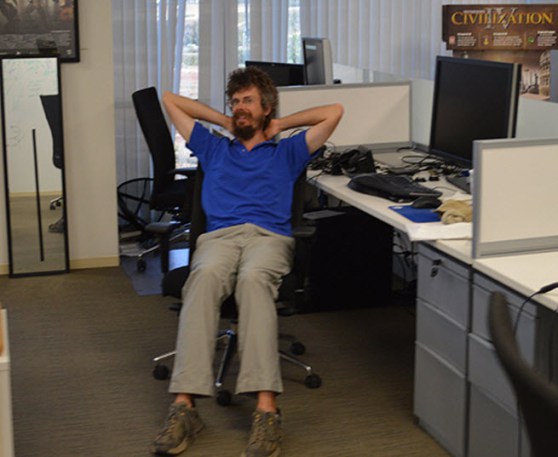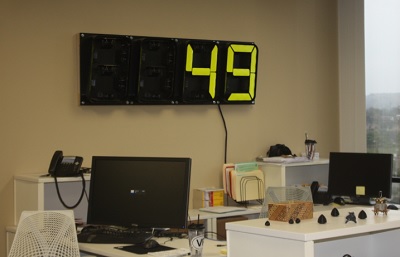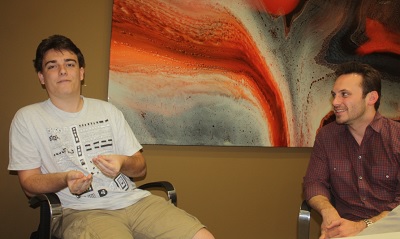GamesBeat: You seem to have gotten the attention of a lot of big companies as well. Folks like Intel and Nvidia care about this now, because they see it pushing computing forward.
Luckey: Some people answer e-mails now. [laughs]
Iribe: Now there are people who send us e-mails offering support. It’s up to us to answer the e-mail now. It’s really helped. VR is a lot bigger than Oculus. There’s a lot more involved in the whole experience than just our tech. There’s the PC, the video card, the CPU, all the different components. We benefit, and the whole experience gets a lot better, if the hardware guys are eager to make it better.
Luckey: They’re eager to make VR work because VR is a huge driver for graphics improvements. People have been saying for a long time that we’re reaching some plateau as far as what we can get graphically. VR is something that needs to always run at 60 frames per second or better. Really you want 100, 200 frames per second. You need high resolution. You need 3D, so you’re already rendering two scenes instead of one. It’s something that brings the requirements up again.
Iribe: You start to notice textures and things. When you look closer at something, you expect to get higher detail. Now, you need high-detail textures. You can walk up close to a wall and have it be blurry in VR. It looks very wrong.
GamesBeat: You also have to sell this at a consumer price. You have to have Moore’s Law helping you out for that.
Iribe: Even on the headset itself, the components there — For a number of screen manufacturers, they’re reaching the point of not being able to visually tell the difference in resolution on a cell phone between today’s 1080p and a 4K screen. Could you really tell the difference? Probably not on a mobile phone with your naked eye. Now, on a VR headset, you can tell a big difference. For a number of companies and engineers, this just opens up a new path of innovation. It’s very exciting. It gives people a reason to make better GPUs, CPUs, screens, all kinds of parts.
I think people will be really happy with the first consumer experience that they get. In fact, in the discussion we’ve had with Valve and a number of the people involved — Personally, I don’t know how Palmer feels, but I’m impressed at what the consumer version is going to be. It’s better than what I thought it would be. A lot of problems have been solved that we didn’t know we would solve in this first consumer experience.
Luckey: When you said, “So is that what we’re going to be consumerizing?” the reason I said, “Not really” is because what we’re making into a consumer product is actually far better than that. Far better than the HD prototype. What people have seen is nothing compared to what’s coming.
GamesBeat: It must feel good that even in a year where new consoles were announced, you guys came away from the show one-upping them.
Luckey: Just a little bit.
Iribe: We won Best Hardware, yeah, at their show. It was exciting. That just shows that there’s a demand for something new. I think the consoles are great. But they’re a faster version of what’s there today. There’s not something too fundamentally different about them. How excited can you get about a controller adding a “Share” button? It’s neat, and I’m sure it will open up new doors, but it leaves a little more to be desired.
Luckey: The other thing is, I think a lot of people are excited about VR because you can see it continuously evolving. You can see something today and know it’s going to be better next year. You can guess, based on our strategy of being on PC, that it’s going to keep getting better. When a console’s announced, what you get is what you get. It’s not going to change all that much over seven or eight years. They might add new stuff. Kinect was added late in the Xbox 360 lifecycle. But what they announce, people know it’s going to be that way for a long time.
Iribe: There are a lot of advantages to that because then you can develop to a dedicated piece of hardware and you can make a big investment in it.
GamesBeat: But you want to be part of something that improves.
Iribe: Yeah. That’s what’s excited a lot of people about mobile. Mobile has improved very fast and innovated very quickly.
Luckey: It’s moving way faster than PCs.
Iribe: I think you’ll see more innovation in VR than any of the other spaces, especially over the next five or 10 years. It’s going to move quickly. What’s the VR going to look like seven or eight years from now toward the end of the console cycle? It’s going to be pretty incredible.
Luckey: You know what Abrash said at his GDC talk? You’ll have to look for the quote, but it was something like, “Personally, I think the next 15 years of gaming are going to be more exciting than my entire past career.”
Iribe: I think what he was pushing there is that there will be more innovation, especially around VR gaming, than there has been in the past around 3D gaming. There are more problems to solve. His talk was called, “Why VR Is Really Hard.” So he did say that, along with this exciting path ahead, it is going to be much harder than the last 15 years have been. This isn’t just rendering more triangles. A lot of human factors need to be solved.
GamesBeat: Once you get this out on the PC, then you have to do it in Google Glass, right?
Iribe: Or mobile. We’ll see how it all goes. It’s PC first, but we’re very excited about the mobile side of things as well.
Luckey: We’re not going to stay static for seven or eight years. We’re going to continuously try to make a better product.
Iribe: I think people have an appetite for VR at $200, $300, $400. It’s something so new and improves so quickly, people do have an appetite to buy that. If people are getting a new VR headset every two or three years that’s incredibly improved, you want to go do that. You want to see this new thing.
Luckey: Especially for PC gamers, who are used to dumping far more money into displays. I’ve spent more money on a keyboard than on the Rift. [laughs] I’ve spent several times more on most of my graphics cards. If you’re passionate about PC games and that’s where you’re putting your money, the Rift is a bargain.
GamesBeat: Have you heard about any competitors jumping in?
Luckey: It depends. Are they a competitor, or can they compete? [laughs]
Iribe: Not yet. But it’s inevitable. We imagine that some people will jump into the AR and VR space that are complementary. We look at Google Glass. It’s very complementary. It’s not competitive. It’s a different experience. It’s used for different purposes.
Luckey: Nobody is going to say, “I was going to buy a Rift, but instead I’m going to buy Glass.”
Iribe: Competition is inevitable, and at the end of the day, it will help us make a better product.
VentureBeat's mission is to be a digital town square for technical decision-makers to gain knowledge about transformative enterprise technology and transact. Learn More




